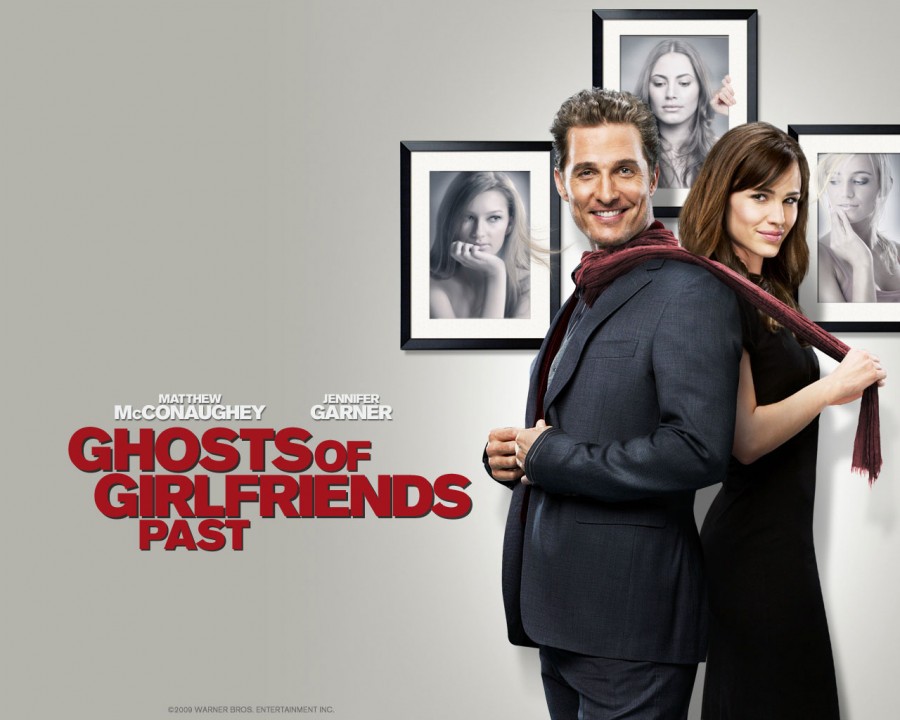Ghosts of Girlfriends Past: Stereotypes of Men and Women
February 4, 2015
A junk looking romantic comedy that is neither romantic or funny. It’s the old hollywood trick where you take an old idea, twist it around a bit, add some salt and spices and bam, you get a movie that has its plot eased with some cheap glamour. For Ghosts of Girlfriends past it’s this one: A spicy gloss on Charles Dickens ‘A Christmas Carol.’
In Ghost of Girlfriends past, The male lead character Connor, (Matthew McConaughey) is depicted as strong, dominant, confident, sensitive and “fixable” womanizing playboy who’s afraid of commitment and whose ambition is to sleep with every woman he meets, as soon as possible. Jenny (Jennifer Garner) is Connor’s childhood best friend whom he loved dearly, but she ended up breaking his heart and as time went by, they drifted apart.
It is distinctly obvious that Connor still has feelings for Jenny after he sees her at his brothers wedding as he doesn’t know how to react when he sees her there. He gives a drunken speech about how love and commitment is a waste of time; however, this all changes when the spirit of his Uncle Wayne visits him and takes him on a tour of his wretched womanizing ways, after he lost Jenny, leading to a development which I have no reward for anyone who predicts what will happen next.
Ghosts of girlfriends past accurately depicts a scene where Connor is shown as afraid of commitment in which he is asked about his opinion about marriage. “It’s magical comfort food for the weak, and uneducated. Yeah it makes you all warm, and happy; but, in the end love leaves you weak, dependent, and fat. I’m condemned to see the world as it is, love? Love is a myth.” Connor replies to the question while drinking whisky.
On the other hand, Jenny is only shown in the movie for a screen time of 30 minutes- and that may be a generous estimate. The women are underrepresented and not given much screen time, and when they are, they are shown emotional, submissive, romance-obsessed, and in need of a man. It also shows that men are “fixable” and that the right woman can change a man. After Connors enlightening journey with the ghosts, he realizes that he needs Jenny and goes to find her.
“Jenny! I’m stupid, ignorant, and oblivious. I never meant to put you through what I did. I love you, Jenny.”
“You told me that before. I love you, Jenny. You’re not capable of loving anyone but yourself!” Jenny says.
Connor then pulls out the first photo he ever took, a photo of, Jenny. “I’ve kept this all these years.”
Jenny looks at Connor stunned and speechless.
“All I ever needed was the right woman, and that’s you.”
This might suggest to the viewer that the right woman can change a man from lacking commitment and permanence in a relationship to making them present in a relationship. It also shows that women will easily forgive a man for the sake of romance and love, which helps reinforce the old concept where women want the bad boy and
There is an undertone of misogyny in the way Connor treats women like objects. Not only do the women in the movie let him, but they encourage him. Women in the film are treated atrociously and are seen as idiots who should answer to every man’s whim. The conservative “fidelity pays off and everyone ends up with someone” message, all within a heterosexual and ethnically conservative sensibility is trying to get the message across that it is o.k. for a man to sleep around because he is heartbroken and it’s totally fine if he is a jerk as long as he settles with someone, while women are valued in terms of their function as disposable sexual partner, are idiots, and only want a man in order to be happy. In real life, if women met a man like Connor, they would brush him off and view him as a likely carrier of STD’s.
If you’re hoping to see a sappy, lovey dovey, Nicholas Sparks type romance, then go look for another movie. Although Ghosts of Girlfriends past falls flat on acting, character development, and has an utterly predictable plot, there are some good lines in the movie, but for each one there is a cringer that reinforces negative stereotypes. For those who think it’s “just a movie,” I’d say that this is how sexism, misogyny, stereotypes and outdated gender roles persist in the media and become fixed into our heads.
Rate: 5.5/10



